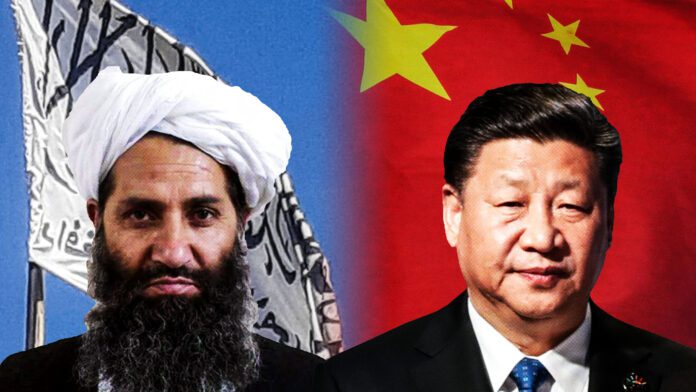In 2020, China became the second-largest export destination for Afghan goods after Pakistan. For China, Afghanistan enjoys a strategic geographic position, offering a potential shortcut for imports of oil and gas from the Middle East, along with neighboring Pakistan. Hence, a stable Afghanistan can lead to; increased trade, connectivity, and investment opportunities, aligning with China’s broader regional and global aspirations.
China has maintained diplomatic relations with Afghanistan, having recognized the Afghan government at various points in its recent history. China also played a role in facilitating talks between the Afghan government and the Taliban, and was one of the first foreign countries to pledge emergency and humanitarian aid (worth 200 million yuan) to Afghanistan.
China has also maintained direct communication with the Taliban administration, and both sides have met on several occasions, bilaterally and internationally, to discuss plans for Afghanistan reconstruction. Beijing has also been active in various; international, multilateral talks on Afghan issues with regional and international actors.
To give an overview of how China-Afghanistan’s bilateral relationship strengthened over the years, following are the key points:
- Trade flow between China and Afghanistan: Afghanistan’s main trading partners are its neighbors, and China is one of its largest trading partners. In 2020, China became the second-largest export destination for Afghan goods after Pakistan. It was also the top source of imported goods for Afghan markets, following the United Arab Emirates (UAE), Pakistan, and India. (Central Bureau of Statistics of Afghanistan}. According to the International Trade Centre (ICT), Afghanistan’s exports to China have grown over the last 25 years at a yearly rate of 4.84 percent, from US$16.6 million in 1995 to US$49.53 million in 2021.
- Multilateral engagement efforts: The two sides have established the China-Afghan Joint Committee on Economics and Trade (JCET), held in 2010, 2015, and 2017. In 2022, China has granted zero-tariff treatment to 98% of the tax items from Afghanistan. (Global Times)
- Belt and Road Initiative (BRI): Afghanistan is in need of significant infrastructure development, including roads, railways, energy projects, and connectivity networks and through BRI, it can improve its transportation and trade connectivity, which could help stimulate economic growth and regional integration. Similarly, for China, Afghanistan enjoys a strategic geographic position, offering a potential shortcut for imports of oil and gas from the Middle East, along with neighboring Pakistan.
- The Silk Road trade routes: The new administration of Afghanistan has been in talks with China to reopen the historical Silk Road trade routes, particularly the Wakhan Corridor, an Afghan valley route that divides China and Tajikistan and connects China with Afghanistan via a 98 km-wide strip of land. The IEA has announced its preparations for the opening of this corridor requesting the Chinese counterpart to cooperate on the project so as to increase the level of trade between the two countries and become a reliable route for the transit of goods.
- CPEC: Previously, Kabul was hesitant to approve deals with Beijing given how the US was heavily involved with the Afghan government. Now, authorities in Kabul are considering extending the US$62 billion CPEC. Chinese leaders have reportedly already been negotiating a deal with Kabul authorities to invest in Afghanistan’s infrastructure under the BRI.
- China-Kyrgyzstan-Uzbekistan-Afghanistan corridor: In August 2022, Uzbekistan suggested the establishment of a new Central Asian “China-Kyrgyzstan-Uzbekistan-Afghanistan” transportation route. According to the Uzbek side, establishing favorable circumstances for freight transportation is crucial when planning a new corridor, and introducing competitive rates is of utmost importance.
- North-south Trans-Afghan railway: In July 2022, China’s special envoy to Afghanistan, Yue Xiaogong, stated that Beijing is ready to support the implementation of Afghanistan transport projects, including a railway that would connect Uzbekistan’s Mazar-i-Sharif, Afghanistan’s capital city Kabul and Peshawar.
- Pine nuts air transport corridor: The trade of pine nuts between China and Afghanistan sheds insight into Beijing’s growing interest in the area along its western border. Opened in 2018, the so-called “pine nut air transport corridor” is an air freight route established between the two nations to help Afghanistan’s pine-nut business which brought a revenue of US$15 million for the locals within the first four months of its operation.
- Oil extraction deal: On January 5, 2022, the Afghanistan Taliban-led administration signed a deal with a Chinese company to extract oil from the Amu Darya basin and create an oil reserve in Sar-e Pul province in the northern part of the country. The Chinese side will invest up to US$150 million annually, which will grow to US$540 million in three years.
- Shanghai Cooperation Organization: Afghanistan started to engage with the Shanghai Cooperation Organization (SCO) in 2005 by signing a protocol establishing the SCO-Afghanistan contact group. Through the SCO, China aims to give Afghanistan new opportunities. At the same time, Beijing also urges Afghanistan, especially the interim Taliban regime, to honor its security commitments and ensure the safety of the Afghan people, diplomats in Afghanistan, and Chinese citizens.
Stability in Afghanistan is crucial for China’s long-term economic and strategic interests, particularly in the context of its Belt and Road Initiative (BRI). A stable Afghanistan can lead to; increased trade, connectivity, and investment opportunities, aligning with China’s broader regional and global aspirations. For the relationship between China and Afghanistan to progress positively, Afghanistan should prioritize its efforts to combat extremism and ensure regional stability.




